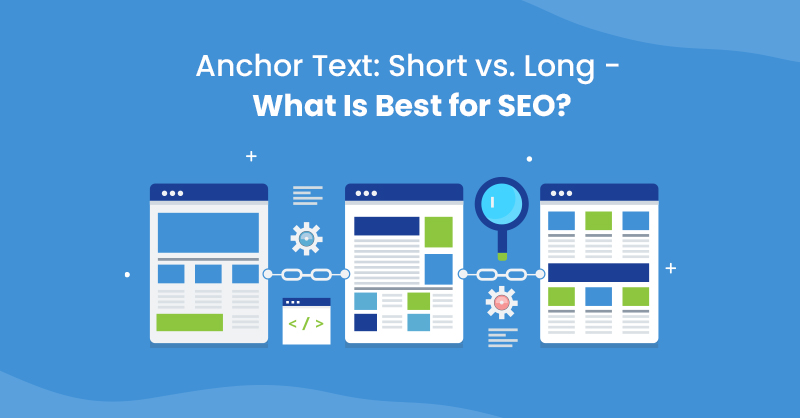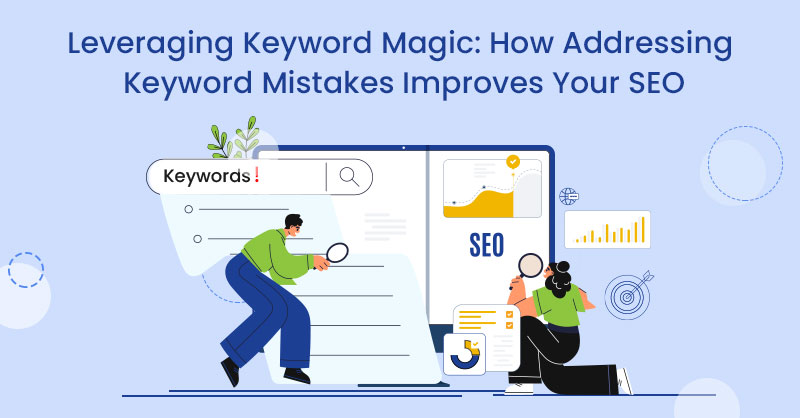A little while ago, Manick Bhan of LinkGraph published a helpful overview of best practices for anchor text at the Content Marketing Institute.
The piece contained lots of helpful information, including an overview of what anchor text is and how it helps your SEO, plus 3 key mistakes to avoid and a checklist. It’s a great piece for those just learning about anchor text and its role in SEO.
And if you’re not sure why anchor text is important, I highly recommend you read Manick’s article before you read this one.
Can Anchor Text be Too Long?
However, I couldn’t help but notice a problem with Manick’s Mistake to Avoid # 2, anchor text which is “Too Long”
Manick wrote:
“More specificity in your anchor text can provide Google with better context. However, long anchor text becomes a problem when it is unclear or overloaded with keywords. While Google details no exact guidelines, it and site visitors prefer descriptive but succinct anchor text.
Example:
Bad: Learn more about our annual winter sale.
Better: Learn more about our annual winter sale.
Best: Learn more about our annual winter sale.”
He then provided a sample tweet you could tweet out in support of this idea.
If you’re paying attention you’ll notice my above link to the source article. And you’ll see I don’t agree with Manick.I don’t agree with two parts of his assertion that long anchor text is automatically bad anchor text. (And I especially don’t agree with the idea that 7 words constitutes “too long” anchor text.) First, the list of Bad, Better, Best. For me, the natural human thing to do here is what Manick labels “Bad.”
How is “Learn more about our annual winter sale” “unclear” or “overloaded with keywords”?
It’s neither unclear nor overloaded with keywords, in my opinion.It’s quite clear as to what is going to be at the page you click through to, both to humans and robots. And is adding “annual” overloading “winter sale” with keywords? Based upon what? And this brings us to the source for Manick’s claim and the second issue I take with the claim that “Learn more about our annual winter sale” is worse anchor text than “winter sale” or even “annual winter sale.”
The source for this claim is a Search Engine Journal interview with Google’s John Mueller from November 2020.
Here is the relevant question in the John Mueller interview:
“Do you treat anchor text that contains many words differently in comparison to anchor text that contains 2 words only?
I mean do you assign more value to those two words when you compare it to anchor text that has like 7 or 8 words?
For example – 2 words anchor text like “cheap shoes” and the 7 word anchor text is “you can buy cheap shoes here.”
Can you elaborate on that?”
And here is Mueller’s answer:
“I don’t think we do anything special to the length of words in the anchor text. But rather, we use this anchor text as a way to provide extra context for the individual pages.
Sometimes if you have a longer anchor text that gives us a little bit more information. Sometimes it’s kind of like just a collection of different keywords.
So, from that point of view, I wouldn’t see any of these as being better or worse. And it’s something where, especially for internal linking, you want to probably focus more on things like how can you make it clearer for your users that if they click on this like this is what they’ll find.
So that’s kind of the way that I would look at it here. I wouldn’t say that shorter anchor text is better or shorter anchor text is worse, it’s just a different context.”
Let’s take this John Mueller quote as gospel, even though we shouldn’t do that. (What we should do is a gigantic study that includes both average length of anchor text and keyword density and correlates it with SERP positions. But anyway…)
Is Mueller saying you shouldn’t have long anchor text?
He literally says “I don’t think we do anything special to the length of words in the anchor text.”
Now, the way he actually says it is confusing, as it sounds like he is talking about the individual lengths of words, not the length of the anchor text itself. But let’s assume he meant the number of words not the length of words.
He then says:
“Sometimes if you have a longer anchor text that gives us a little bit more information. Sometimes it’s kind of like just a collection of different keywords.”
What Mueller is complaining about here is the old and abused practice of unnatural keyword stuffing in anchor text. To use Manick’s example, it would be something like this:
“Annual winter shoe sale at Our Shoe Store Boxing Week”
An unnatural sentence and full of too many keywords. Manick’s completely right. That’s bad.
Now, Mueller didn’t actually directly address the question asked by Search Engine Journal in that source article. But he did give some helpful guidance:
“So, from that point of view, I wouldn’t see any of these as being better or worse. And it’s something where, especially for internal linking, you want to probably focus more on things like how can you make it clearer for your users that if they click on this like this is what they’ll find.
So that’s kind of the way that I would look at it here. I wouldn’t say that shorter anchor text is better or shorter anchor text is worse, it’s just different context.”
Which is exactly why I thought Manick was wrong to conclude from the John Mueller interview that shorter anchor text is better and longer is worse, regardless of context.Context is what matters, not whether your anchor text is two words or seven words long.It’s interesting to note what the author of the John Mueller interview, Matt Southern, concludes from this interview:
“That doesn’t mean write detailed anchor text for every page, but do consider long anchor text for URLs that are particularly important.
Examples of such URLs are:
- High value pages on your own website.
- Content you’ve contributed to other sites.
- Pages that contain links back to your website.
- Pages that contain mentions of you or your brand/business.
And so on.”
I’m not sure how either what Mueller said or Matt’s conclusion leads to Manick’s examples of bad vs. best anchor text, with the shorter anchor text coming out on top. Mueller didn’t give a definitive answer to Matt’s question but he also didn’t say make your anchor text two words. And Matt certainly didn’t conclude that two-word keyword anchor text is always better than 7 word anchor text containing the same keyword.
How Long Should Anchor Text Be?

A big question here is, as always, can we take Google at their word?
Maybe John Mueller is being coy, or maybe he’s being helpful. If we assume he’s being helpful, then the key takeaway is that anchor text is contextual.
Length of Anchor Text Depends on Context.
There might be instances - perhaps many instances - where it makes sense to only use “winter sale” in your anchor text for your page about your winter sale.
But there are also instances where it makes sense to use “annual winter sale” or even the dreaded “Learn more about our annual winter sale.”
Because, the thing is, “Learn more about our annual winter sale” provides context - it is literally telling the user what can be expected at the webpage at the other end of the link.
Why is that a bad practice, exactly?
If Manick has evidence that it is a bad practice, he should have presented it in the article, instead of linking to an interview that did not actually provide that evidence.
Anchor Text Should Be as Natural as Possible
As Manick helpfully states in his article, there are a number of different types of anchor text:
- “Branded – Contains your company name or terms unique to your domain
- Exact match – Includes the exact keyword you want to rank for
- Partial Match – Contains a variation of the keyword you want to rank for
- Naked URLs – Includes plain URL, such as www.contentmarketinginstitute.com
- Generic – Provides the least amount of context, such as “click here,” “page,” or “read more.”
Manick is absolutely right about generic anchor text - don’t use it!
And though naked URLs are actually quite a normal human thing to use - just spend some time on some forums - they may not provide the context Google is looking for. (To be clear, there is absolutely nothing wrong with a naked url link. If you have a bunch of backlinks with naked anchor text, that is entirely “natural” in the Google sense of “natural” linking.)
Ideally, you want branded anchor text, exact match or partial match. Except when you don’t.
Yes, it’s complicated.
That’s because context is everything.
On Page Anchor Text vs. Off Page Anchor Text
There is an obvious difference between the anchor text you use on your own website versus the anchor text someone uses to link to your website.
In the case of your own anchor text, you want to use an exact match or partial match keyword naturally, in a sentence. The anchor text can indeed be “winter sale” or ““Learn more about our annual winter sale.” One is not obviously better than the other without the context of an actual webpage with which we can evaluate that context. (And, specifically, the context of the paragraph that contains that anchor text.)
However, I interpret Google’s demands for context to be, at the very least, tacit approval of longer anchor text, provided it is an English sentence and not keyword soup.
But off-page, well there you are going to want some branded anchor text in addition to exact or partial match keyword anchor text. And you may also want naked urls.
The issue with off-page anchor text is that people have been playing the link-building game for as long as Google has existed. And they’ve done all sorts of things that have come to be regarded as signals of “unnatural” linking.
One of those signals is exact keyword match. So if you are link-building for your site or a client’s site, you don’t want to use exact match very often, as too much of it could be interpreted as “unnatural” linking. (John Mueller said on Twitter in early November that Google doesn’t want you link-building. That is the topic of another article.)
Stop Treating SEO Like a Game - Help People Instead
Google wants their users to find the sites that match their search intent. If you want Google to rank your site for people who are looking for it, you should aim to serve those searchers. One way in which you can do this is by writing like a human for humans, not like someone trying to appease the AI gods.
Long anchor text that makes sense in a sentence is usually fine, both because Google can understand it and, crucially, because humans can understand it.







on
Should we use Long-tail Keywords instead of Short-tail keywords for anchor text?
on
Thank you for writing this informative article. Its really helpful! Can you please share more information relating to such topics.
on
Very detailed article with good examples. Different types of Anchor texts is really helpful. Thank You!
on
your published article is really great in all and visitors can get more inspiration from this kind of informative blogs for their desired topics so I really appreciate you, well I have also some of the high-quality informative articles which are relevant as your topics and please check it